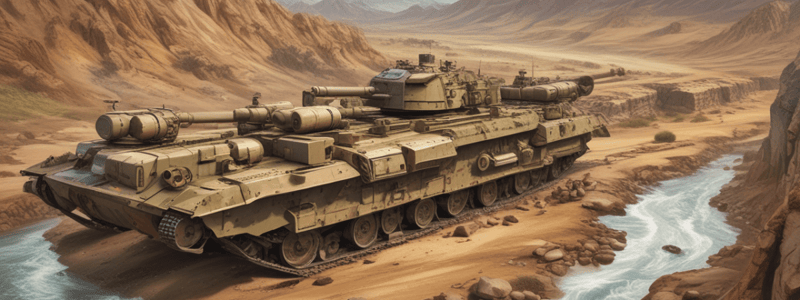Podcast
Questions and Answers
What is the process called when lines are first run around the perimeter of a plot and details are fixed in relation to these lines?
What is the process called when lines are first run around the perimeter of a plot and details are fixed in relation to these lines?
- Traversing
- Establishing
- Triangulation (correct)
- Circuiting
In surveying, what is a 'traverse station'?
In surveying, what is a 'traverse station'?
- A point where a survey starts
- A point of interest on the ground (correct)
- A straight line between two consecutive points
- A connected line in a closed traverse
Which type of traverse does not form a closed circuit and does not return to the starting point?
Which type of traverse does not form a closed circuit and does not return to the starting point?
- Boundary Traverse
- Open Traverse (correct)
- Triangulation Traverse
- Circuiting Traverse
Why is a triangle preferred in surveying according to the text?
Why is a triangle preferred in surveying according to the text?
What is the process of establishing lines between points in surveying referred to as?
What is the process of establishing lines between points in surveying referred to as?
When does a survey form a closed traverse?
When does a survey form a closed traverse?
What is the main purpose of conducting a Geological Survey?
What is the main purpose of conducting a Geological Survey?
Which type of survey involves taking linear measurements with no angular measurements made?
Which type of survey involves taking linear measurements with no angular measurements made?
What is the primary method used in Triangulation Survey?
What is the primary method used in Triangulation Survey?
In Military or Defense Survey, what is the main focus of mapping?
In Military or Defense Survey, what is the main focus of mapping?
What distinguishes Plane Table Survey from other survey methods?
What distinguishes Plane Table Survey from other survey methods?
What is the main characteristic of Leveling in surveying?
What is the main characteristic of Leveling in surveying?
Flashcards are hidden until you start studying
Study Notes
Surveying Methods
- Lines are first run around the perimeter of the plot, then details are fixed in relation to the established lines, a process called triangulation.
- Triangles are preferred in surveying as they can completely cover an irregularly shaped area with minimum space left.
Traverse Survey
- Traverse survey involves establishing the position of a point on the ground using the bearing and distance of a known point.
- From this point, the bearing and distances of other surrounding points can be established, creating a network of connected lines.
Types of Traverses
Closed Traverse
- A closed traverse involves a series of connected lines that form a closed circuit, where the finishing point coincides with the starting point of a survey.
- Suitable for surveying boundaries of ponds, forests, etc.
Open Traverse
- An open traverse involves a sequence of connected lines that extend in a general direction and do not return to the starting point.
- Suitable for surveying areas where a return to the starting point is not necessary.
Classification of Surveys
By Purpose
- Engineering survey
- Control survey: uses geodetic methods to establish widely spaced vertical and horizontal control points
- Geological survey: determines the structure and arrangement of rock strata
- Military or Defense Survey: maps places of military and strategic importance
- Archeological survey: discovers and maps ancient relics of antiquity
By Instrument Used
- Chain/Tape Survey: uses a chain or tape for linear measurements with no angular measurements
- Compass Survey: uses a magnetic compass for horizontal angular measurements with linear measurements
- Plane table survey: quick survey carried out in the field with simultaneous measurements and drawings
- Leveling: measures and maps relative heights of points on the earth's surface
- Theodolite Survey: takes vertical and horizontal angles to establish controls
Studying That Suits You
Use AI to generate personalized quizzes and flashcards to suit your learning preferences.





